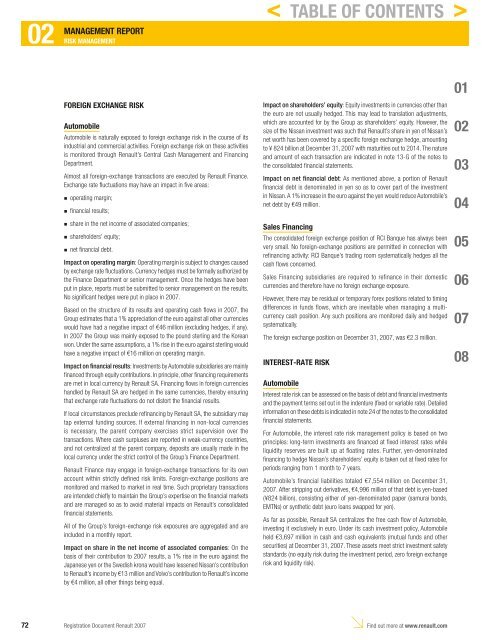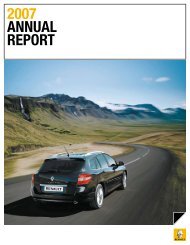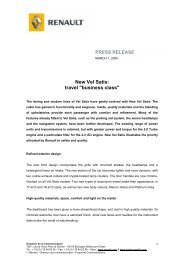2007 Interactive Registration Document - Renault
2007 Interactive Registration Document - Renault
2007 Interactive Registration Document - Renault
Create successful ePaper yourself
Turn your PDF publications into a flip-book with our unique Google optimized e-Paper software.
02 RISK<br />
MANAGEMENT REPORT<br />
MANAGEMENT<br />
FOREIGN EXCHANGE RISK<br />
Automobile<br />
Automobile is naturally exposed to foreign exchange risk in the course of its<br />
industrial and commercial activities. Foreign exchange risk on these activities<br />
is monitored through <strong>Renault</strong>’s Central Cash Management and Financing<br />
Department.<br />
Almost all foreign-exchange transactions are executed by <strong>Renault</strong> Finance.<br />
Exchange rate fl uctuations may have an impact in fi ve areas:<br />
n<br />
n<br />
n<br />
n<br />
n<br />
operating margin;<br />
fi nancial results;<br />
share in the net income of associated companies;<br />
shareholders’ equity;<br />
net fi nancial debt.<br />
Impact on operating margin: Operating margin is subject to changes caused<br />
by exchange rate fl uctuations. Currency hedges must be formally authorized by<br />
the Finance Department or senior management. Once the hedges have been<br />
put in place, reports must be submitted to senior management on the results.<br />
No signifi cant hedges were put in place in <strong>2007</strong>.<br />
Based on the structure of its results and operating cash fl ows in <strong>2007</strong>, the<br />
Group estimates that a 1% appreciation of the euro against all other currencies<br />
would have had a negative impact of €46 million (excluding hedges, if any).<br />
In <strong>2007</strong> the Group was mainly exposed to the pound sterling and the Korean<br />
won. Under the same assumptions, a 1% rise in the euro against sterling would<br />
have a negative impact of €16 million on operating margin.<br />
Impact on financial results: Investments by Automobile subsidiaries are mainly<br />
fi nanced through equity contributions. In principle, other fi nancing requirements<br />
are met in local currency by <strong>Renault</strong> SA. Financing fl ows in foreign currencies<br />
handled by <strong>Renault</strong> SA are hedged in the same currencies, thereby ensuring<br />
that exchange rate fl uctuations do not distort the fi nancial results.<br />
If local circumstances preclude refi nancing by <strong>Renault</strong> SA, the subsidiary may<br />
tap external funding sources. If external fi nancing in non-local currencies<br />
is necessary, the parent company exercises strict supervision over the<br />
transactions. Where cash surpluses are reported in weak-currency countries,<br />
and not centralized at the parent company, deposits are usually made in the<br />
local currency under the strict control of the Group’s Finance Department.<br />
<strong>Renault</strong> Finance may engage in foreign-exchange transactions for its own<br />
account within strictly defi ned risk limits. Foreign-exchange positions are<br />
monitored and marked to market in real time. Such proprietary transactions<br />
are intended chiefl y to maintain the Group’s expertise on the fi nancial markets<br />
and are managed so as to avoid material impacts on <strong>Renault</strong>’s consolidated<br />
fi nancial statements.<br />
All of the Group’s foreign-exchange risk exposures are aggregated and are<br />
included in a monthly report.<br />
Impact on share in the net income of associated companies: On the<br />
basis of their contribution to <strong>2007</strong> results, a 1% rise in the euro against the<br />
Japanese yen or the Swedish krona would have lessened Nissan’s contribution<br />
to <strong>Renault</strong>’s income by €13 million and Volvo’s contribution to <strong>Renault</strong>’s income<br />
by €4 million, all other things being equal.<br />
< TABLE OF CONTENTS ><br />
Impact on shareholders’ equity: Equity investments in currencies other than<br />
the euro are not usually hedged. This may lead to translation adjustments,<br />
which are accounted for by the Group as shareholders’ equity. However, the<br />
size of the Nissan investment was such that <strong>Renault</strong>’s share in yen of Nissan’s<br />
net worth has been covered by a specifi c foreign exchange hedge, amounting<br />
to ¥ 824 billion at December 31, <strong>2007</strong> with maturities out to 2014. The nature<br />
and amount of each transaction are indicated in note 13-G of the notes to<br />
the consolidated fi nancial statements.<br />
Impact on net financial debt: As mentioned above, a portion of <strong>Renault</strong><br />
fi nancial debt is denominated in yen so as to cover part of the investment<br />
in Nissan. A 1% increase in the euro against the yen would reduce Automobile’s<br />
net debt by €49 million.<br />
Sales Financing<br />
The consolidated foreign exchange position of RCI Banque has always been<br />
very small. No foreign-exchange positions are permitted in connection with<br />
refi nancing activity: RCI Banque’s trading room systematically hedges all the<br />
cash fl ows concerned.<br />
Sales Financing subsidiaries are required to refinance in their domestic<br />
currencies and therefore have no foreign exchange exposure.<br />
However, there may be residual or temporary forex positions related to timing<br />
differences in funds fl ows, which are inevitable when managing a multicurrency<br />
cash position. Any such positions are monitored daily and hedged<br />
systematically.<br />
The foreign exchange position on December 31, <strong>2007</strong>, was €2.3 million.<br />
INTEREST-RATE RISK<br />
Automobile<br />
Interest rate risk can be assessed on the basis of debt and fi nancial investments<br />
and the payment terms set out in the indenture (fi xed or variable rate). Detailed<br />
information on these debts is indicated in note 24 of the notes to the c onsolidated<br />
fi nancial s tatements.<br />
For Automobile, the interest rate risk management policy is based on two<br />
principles: long-term investments are fi nanced at fi xed interest rates while<br />
liquidity reserves are built up at fl oating rates. Further, yen-denominated<br />
fi nancing to hedge Nissan’s shareholders’ equity is taken out at fi xed rates for<br />
periods ranging from 1 month to 7 years.<br />
Automobile’s financial liabilities totaled €7,554 million on December 31,<br />
<strong>2007</strong>. After stripping out derivatives, €4,996 million of that debt is yen-based<br />
(¥824 billion), consisting either of yen-denominated paper (samurai bonds,<br />
EMTNs) or synthetic debt (euro loans swapped for yen).<br />
As far as possible, <strong>Renault</strong> SA centralizes the free cash fl ow of Automobile,<br />
investing it exclusively in euro. Under its cash investment policy, Automobile<br />
held €3,697 million in cash and cash equivalents (mutual funds and other<br />
securities) at December 31, <strong>2007</strong>. These assets meet strict investment safety<br />
standards (no equity risk during the investment period, zero foreign exchange<br />
risk and liquidity risk).<br />
72 <strong>Registration</strong> <strong>Document</strong> <strong>Renault</strong> <strong>2007</strong><br />
Find out more at www.renault.com<br />
01<br />
02<br />
03<br />
04<br />
05<br />
06<br />
07<br />
08




